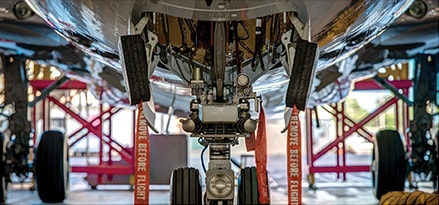Innovation is all about problem solving—the perpetual search for things to fix, to optimize, to reinvent. ExxonMobil has remained at the forefront of the aviation fuel and lubricant industry since its inception thanks in no small part to its ability to attract employees who are natural problem solvers. In 2018, Mohamed Nouser joined the company’s long list of creative innovators and is in the midst of ascending its ranks of researchers.
We caught up with Mohamed to learn about his journey as a chemist and to hear about his work solving problems for ExxonMobil customers.
What do you do at ExxonMobil?
I’m a Technology Solution Professional for aviation with the EMTEC team at the Clinton, New Jersey facility. My main focus is to provide technical support for OEMs and customers. When a customer has an issue, they'll first go to a sales manager or field engineer. Then I’ll work with Tom Kim (Global Chief Engineer, Aviation Lubricants) to figure out if it’s something EMTEC needs to support, then we’ll work to take care of it.
I also do business continuity plans on our additives. While our product formulations typically don’t change, sometimes the companies that supply certain additives will change their offerings or stop supplying them, and we need find other suppliers. So, I’m responsible for making sure we have a reliable source of supply to make jet oils.
I’m also the product technical advisor for our blend plants, so I’m the main point of contact for any issues or concerns our plants have. Also, I help formulate new aviation products for OEMs when there’s a desire or business case to do so—that all falls under my umbrella.
What got you interested in chemistry, and how much of your work involves chemistry?
I think it was the first subject that I found interesting. I look at chemistry as four things put together: problem solving, logic, reasoning, and math. I didn't know that at the time, but I'd say those four subjects resonate with me the most. I’m very logical and reason-driven; I always enjoyed board games that were problem-solving oriented. And I’ve always been good at math, so I just found myself gravitating toward chemistry. I got a bachelor’s degree in general chemistry at Rider University (in Lawrence, New Jersey) and developed a solid foundational background without going too deep into any specific branch.
I get to apply this training in some aspects of my work more than others. For business continuity plans, I’ll analyze a supplier’s offering from a chemical perspective. What is its molecular structure? Does it meet our requirements from a purity perspective? Does it have anything in it that will jeopardize the jet oil performance? That’s all chemistry based.
For customer support, it’s more about absorbing historical knowledge. For example, Mobil Jet Oil II has been around since the 60s, so we have very good archives. When people ask questions, it’s important to be well versed in the product’s characteristics in order to provide performance insights. And, occasionally, there’s always new technology applications. I would say this typically involves more problem solving than chemistry, but chemistry can always play a role based on our knowledge of the product.
What interested you in working for ExxonMobil?
I didn’t join the company right out of college; I had a couple of other jobs first. I was a contractor at a lab, for example. But ExxonMobil was interesting in particular because of its breadth. Most people probably think of it as a fuels company and don’t realize just how many different kinds of products it produces and industries it’s involved in. That diversity is something that resonated with me. And, in interacting with some former employees earlier in my career, they all said what a great company it was to work for. That left an impression.
What led you to the aviation division?
I didn’t join the aviation group right away. I started at ExxonMobil in the analytical science group, which is mostly focused on testing different lubricants and helping formulators decide on the best formulation for our products. But, I wanted a role outside of the lab, and one in aviation just kind of opened up: the person who previously held my role was moving on to something else and they considered my background, which included aviation experience, and thought I was a great fit.
As a research technician in the analytical division, my initial work consisted mainly of running tests to ensure that lubricants met a certain quality standard that the formulators were looking for. That role helped me understand the different methods of lubricant testing and how it works. Now, as a formulator, I think I have an advantage when it comes to formulating and troubleshooting: the tests don’t always work the way they’re designed, so when customers get weird results, my troubleshooting background helps me analyze the validity of the outcomes.
What are your top priorities at the moment?
I still do a lot of business continuity planning, as well as providing customer support and OEM support—that’s taken up more of my time since I started. When you’re the new person, you're just trying to learn the business, what the products are and how they perform—things like that. Once you have that foundation, you can move to supporting OEMs and customers with their concerns and questions, as well as helping to formulate products that they ask about.
What’s your favorite part of the job?
I’d probably say providing customer and OEM technical support. I think that's where I find the most joy because it has a lot to do with problem solving, as well as keeping the customer OEM happy. The business continuity planning projects are pretty interesting as well: trying to understand from a chemistry perspective why certain suppliers’ samples work and why others don't.
How do you see your job changing in the near future? Are there things on the horizon, like electric or hybrid aircraft, that you expect to influence the direction of your work?
I think it will depend on what the needs are for products in those types of aircraft. Maybe the jet oil can provide what they need, and maybe they would need something different, in which case the role will change to adapt to that.
Eventually, we’ll need to develop new products, and at that point it’ll be about meeting the niche requirements that aviation demands. For example, we’ll need background requirements, like that a lubricant can’t have additives with a metals background. Things like that will give us a head start in meeting not just the specifications for approval, but the expectations of OEMs and customers for performance.
Do you see yourself staying in aviation for a long time?
That’s a challenging conversation. If I stay in aviation, I'd like to explore other areas because that would be a way to grow within the business line. So, that's something that I have been thinking about recently, but I do enjoy what I do. So, if you enjoy what you do, why change that?
Mobil Jet™ oils
Hear from our experts
12/1/2023

